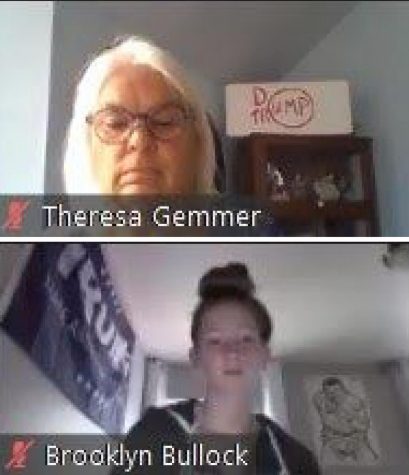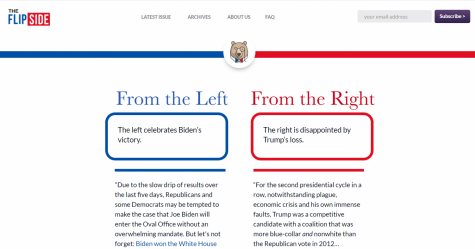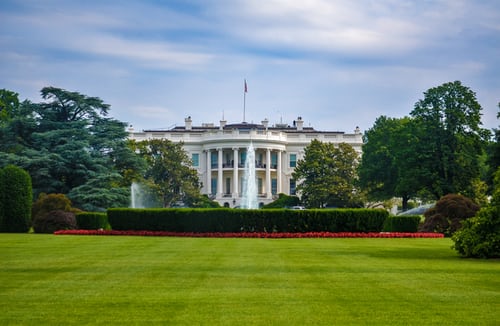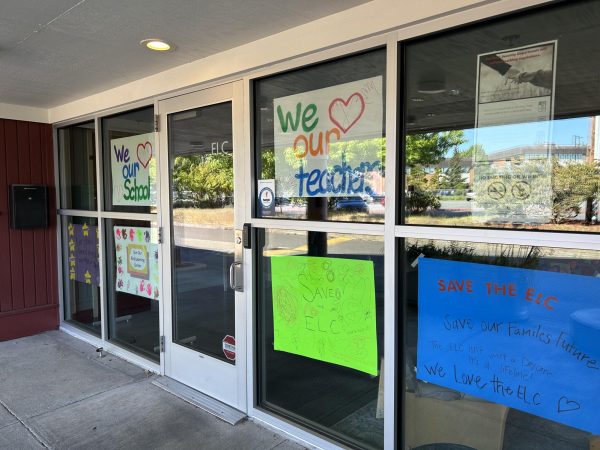The 2020 Election: A Nation Divided
Regardless of election results, the future of bipartisanship is in question as polarization increases.
This is a historic moment for the United States. Joe Biden has won the race to presidency against Donald Trump in a rare incumbent loss. Kamala Harris will be the first woman – and the first woman of color – to hold the office of vice president.
“I feel it was the most important election of my lifetime,” says Theresa Gemmer, a senior auditing classes at EvCC who has voted in the past eleven presidential elections. “I haven’t always been happy with previous presidents, but I always felt like they cared about the United States…I think four more years of Trump could end our democracy.”
This quarter, Gemmer made a political statement in response to classmate Brooklyn Bullock, who

displayed a Trump flag during instructor Denny Gibson’s Zoom Spanish class. “It annoyed me. I [asked] the instructor if there was an EvCC policy about campaign signs since this was essentially our classroom. The professor said he would check, and that meanwhile I could put up my own sign. So I did.”
Gemmer put up her ‘Dump Trump’ sign, but eventually instructor Gibson asked everyone to be conscious of their Zoom backgrounds. She exchanged the sign for a more neutral one that simply said ‘Vote’.
Bullock, a Running Start student too young to vote, says, “I had my [Trump] flag on Zoom not because I wanted to create a statement, but because that was simply where my desk was.” She thinks people should approach political differences with mutual respect and less judgment.
“I have been called a racist, a Nazi, a homophobe, basically every name in the book because I agree with the policies Trump has created or passed.” Bullock says it is more important that she agrees with a candidate’s policies than their personality.
Gemmer has a differing opinion: “I don’t support Trump because he is a liar, disrespectful of women, a bully, because he copied his campaign slogan from Benito Mussolini…because he didn’t know Puerto Rico is a part of the United States, he actively encourages domestic terrorists…” and the list goes on. Despite her strong, public disapproval of Trump, Gemmer doesn’t think people change their minds when they are pressured to; she advises people on opposing political spectrums to be civil and base conversations on their commonalities.
When it comes to partisan disagreement, much of the conversation revolves around seeking common ground. As Americans grow more polarized, however, this becomes more difficult – especially when policies involving existential threats like COVID-19 and climate change are hanging in the balance.
The COVID-19 pandemic is at an all-time high in the United States – as of Nov. 10, a total of 10.3 million cases, over 130,000 new cases reported in one day and a total of 240,000 deaths according to The New York Times. In perspective, that is 4.25 percent of the world’s population with 20 percent of the world’s cases.
Estimations of Edison Research election exit polls reveal a great partisan divide on most issues, including COVID-19. Most Trump voters think he is the best person to handle the pandemic, yet believe rebuilding the economy is more important than containing the virus. The opposite is true of Biden voters.

“We tend to evaluate political truths based on whether ‘our side’ or the other is presenting information,” says Dr. Steven Horn, Political Science and American Government instructor at EvCC. He says the denial of human-induced climate change is an example of misinformation purported by Republicans, while Russia’s involvement in the 2016 election was largely exaggerated by Democrats.
EvCC Intercultural Communications instructor Lori Wisdom-Whitley says that staying informed means more than seeking information that confirms our own bias. When we use the internet, for example, an algorithm filters information based on our activity and creates an experience that doesn’t always support an accurate, complete perspective. This “filter bubble” contributes to the polarization of political opinion and the spread of misinformation.
“Confirmation bias has us interpret new evidence as a confirmation of existing beliefs,” Wisdom-Whitley says. She says we can tackle our “filter bubble” by comparing information from multiple, diverse news sources. “[Daily newsletter] The Flip Side presents both sides of major issues daily,” she says. While using the internet, she advises ad blockers, browsing on Incognito mode and deleting cookies regularly.

It is important to note that in January, there will be two runoff elections in Georgia that will determine which political party has a majority in the Senate. According to Dr. Horn, this is the only chance Democrats have to gain this level of control and give the Biden administration the ability to accomplish their goals. If Republicans keep the Senate, it will likely result in a standstill regarding many important issues many Americans hope the Biden administration will address.
“Average citizens should continue to work for a better future regardless of the dysfunction in Washington, D.C.,” says Dr. Horn. “Almost everything you might say you like about this country is the product of ordinary people pressing the system over usually long periods of time. We all must continue that work and hope it produces the changes we want.”

What interests you about journalism?
I think true journalism seems to be one of the only things keeping our society functioning and moving in a positive...

What are you doing when you aren't at The Clipper?
When I'm not at school I can usually be found either reading a book, playing Skyrim or...

What living person do you most admire?
My wife.
Where would you most like to live?
If I didn’t already live in Everett, I would live in Vancouver,...










